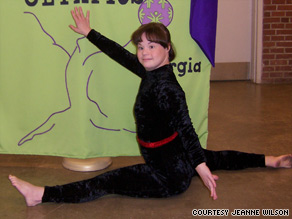
Katy Wilson says she wants her athletic successes to surprise people and give them hope.
Wilson, now 29, has won two international gold medals in the Special Olympics for her gymnastic abilities. She turns cartwheels for her floor routine and does acrobatics on the balance beam.
She also goes on public speaking tours.
"Most of all, I love doing speeches because I want them [the audience] to be surprised just how good my speeches are," she said by phone.
Wilson's story -- and countless other stereotype-bending stories like it -- is possible in part because of the dogged vision of Eunice Kennedy Shriver and the Special Olympics organization she founded more than four decades ago.
Shriver, who died Tuesday, started the organization as a sports camp for special-needs kids and adults in her backyard in Maryland in 1962. Since then, the Special Olympics has grown into a global organization that helps 3 million athletes with Down syndrome, autism and other intellectual disabilities compete for medals in an array of sports.
"She helped forever alter how people with intellectual disabilities are viewed and treated and respected," said Amie Dugan, a spokeswoman for the Special Olympics. "This is a population that 40 years ago they were beyond marginalized. They were disenfranchised from society. It was considered the status quo ... to put them in an institution and never think about that again. And she changed all of that. She brought them out into the light."
An estimated 200 million people in the world live with intellectual disabilities. That population was largely unseen and voiceless in 1968 when Shriver stepped to the microphone to announce the start of the first Special Olympic Games at Chicago's Soldier Field.
"In ancient Rome, the gladiators went into the arena with these words on their lips," she told the 1,000 athletes in the stadium. "'Let me win, but if I cannot win, let me be brave in the attempt.'"
Before the program, people with intellectual disabilities were only told what they could not accomplish, said David Tolleson, executive director of the National Down Syndrome Congress. "Special Olympics emphasizes what folks can do, and it does it in a manner that's fun and exciting and it offers a sense of community both within the family of those with developmental disabilities as well as with the greater community at large -- the volunteers who come in and have some of their misconceptions or preconceptions cast aside when they realize how much people with developmental disabilities truly are capable of."Jeanne Wilson, the mother of the gymnast with Down syndrome , started tearing up when she recounted the moment she saw her daughter -- whose future once looked so uncertain -- standing atop an awards podium with a gold medal draped around her neck.
"It was just amazing because that really gave her confidence. And I don't think people realize how much it means to a young person who you might have thought did not have a future or might not ever have a chance to walk," she said. "To see her doing a routine on balance beam or a floor routine is pretty amazing."
Katy Wilson, who lives in Gainesville, Georgia, continues to train as a gymnast. She also goes bowling with a group of Special Olympians most Fridays. They call themselves the Alley Kats, and Wilson describes the bowlers as some of her best friends.
"I love bowling because it is so much fun being out there being able to have friends," she said. "It's exciting to do bowling because I get a lot of scores."
When she's not in training, Wilson works at a steakhouse as a hostess.
"I get their coffee, I get their bread, I get their drinks, I do the silverware, I sweep up, I do the hostess," she said. "Oh, I love the job because everybody's so nice to me, especially the managers, they give me hope and they're so excited to have me there and I'm so happy to be there with them."
As a global ambassador for the Special Olympics, Wilson tours the country telling people about her life story. She says she hopes it reminds them that everyone can succeed with a positive attitude.
She grew up watching her sister do cartwheels as a cheerleader.
She modeled her life in her sister's image, but she forged a life that's all her own.
great article!!
ReplyDeleteThank you. This is a nice article to read.
ReplyDeleteloved this article.
ReplyDeleteThanks for sharing this!
ReplyDeleteThats such an inspirational story. People should never be told what they Can't do. Who are we to decide what a person is capable of. Only they can do that for themselves. I hope your daughter also has all the opportunities to succeed in life regardless of what people may say.
ReplyDeleteI really enjoyed reading your blog and learning more about down syndrome. With your positive outlook on life, I feel that your blog would be a great addition to Wellsphere's HealthBlogger Network (HBN). The HBN has over 2,600 bloggers that share a common goal to share their knowledge with others, which enables Wellsphere to provide information that is personal and relevant to over 6 million visitors a month. You retain complete ownership and control of your content.
Feel free to visit our Health Blogger Network at http://www.wellsphere.com/health-blogger, where you can apply to join. Or just email me at hua [at] wellsphere [dot] com.
Have a great day!
Hua
Director of Blogger Networks
twitter.com/wellsphere